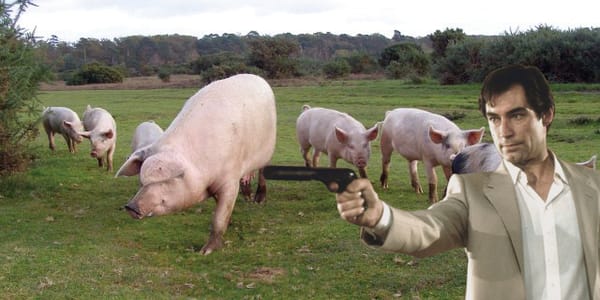Become a vegetarian, save the world!
Carol Wood on her vegetarian experiences
Sustainability is a hot topic. Yet despite all the recent conventions and talks on sustainability, it’s still hard to know what living sustainably really means.
So this year I am conducting my own sustainability experiment. I am calling it ‘12 Sustainable Months of 2012’, and my mission is to find out how sustainable living can realistically be achieved. Every month of 2012 I will be trying a different (supposedly) sustainable lifestyle habit. E.g. I’ll be trying one month of ‘no plastic bags’, one month of ‘zero waste’, one month of ‘sustainable travel’… you get the idea.
This January, I decided to become a weekday vegetarian. This means not eating any meat on weekdays. The idea is that, for those who shudder at the thought of becoming an actual vegetarian, and find the thought of saying “this is my last ever KFC” incomprehensible, this is a more sustainable yet less brutal alternative. (See Graham Hill’s TED talk “Why I’m a weekday vegetarian”.)
On the scale of “I only eat plants” to “I eat a steak for breakfast”, I fall somewhere in the middle. I thought that becoming a vegetarian for just five days a week for one month would be super easy. However, it has not all been plain sailing.
I have found that there are two reasons why being vegetarian is not as easy as expected: 1. Vegetarian options are pretty limited. 2. Meat tastes way better than vegetarian foods.
The first is, I think, the main difficulty. There is a severe lack of vegetarian food available. For starters, the library café provides just two different vegetarian baguettes, both of which are cheese, both of which sell out by about 1pm. Poor form. In addition to this, whilst attending college events throughout January, I have turned down free chicken kebabs, smoked salmon sandwiches and sushi in favour of egg and cheese sandwiches, which is just not cool. This is not to mention experiences outside of college, including going to Nando’s and not ordering chicken, and saying no to bacon sandwiches cooked by my housemate one morning. All in all, it is pretty inconvenient to be vegetarian.
I am not sure that global abstinence from meat is really a realistic solution. But is there another option?
Lack of choice aside, the other main issue is that vegetarian options just don’t taste as good as the meat options. Is there really a meat eater out there who would choose a cheddar and tomato baguette over a chicken and bacon one (especially when they are exactly the same price)? I highly doubt it. On asking one of the biggest meat lovers I know, Eugene Wong, about how he’d feel about giving up meat for five days a week, he said: “Which sane individual would inflict that sort of grave injustice on a fellow human being?” Need I say more?
The main point to consider in this discussion, however, is this: if everyone stopped eating meat, would it actually make a significant difference? Based on a moderately active person with a weight of 65kg who consumes about 2,600 calories per day, it is estimated that a vegetarian has a footprint of 5.5kWh per day and a carnivore has a footprint of 12kWh per day. This means vegetarians have less than half the footprint of carnivores. Although a number of other factors would need to be considered, such as where the animals live, what they eat and so on; the point is that with over 7 billion people on the planet, the energy saved if everyone were to become a vegetarian would be significant.
So, there is a real case for eating less meat. But is there a real solution? If a ‘moderate meat eater’ like myself found it fairly challenging to give up meat five days out of seven for one month, where does that leave the real meat lovers of this world? Sadly, I am not sure that global abstinence from meat is really a realistic solution. But is there another option?
This weekend, The Guardian published an article entitled “Could lab-grown meat soon be the solution to the world’s food crisis?” The author argues that not only could lab grown meat reduce the environmental impact associated with animal rearing, it could be engineered to have less fat and also prevent animal-borne diseases. I am not convinced that eating meat grown in a lab is really that appealing. However, if farming meat for over 7 billion people is unsustainable, yet we are not ready to end our love affair with meat, perhaps a more radical solution such as this should be seriously considered.
I’ll be blogging about my “12 Sustainable Months of 2012” on: http://carolinesarahwood.posterous.com and also tweeting about my experiences on twitter: carosarahwood@twitter.com







